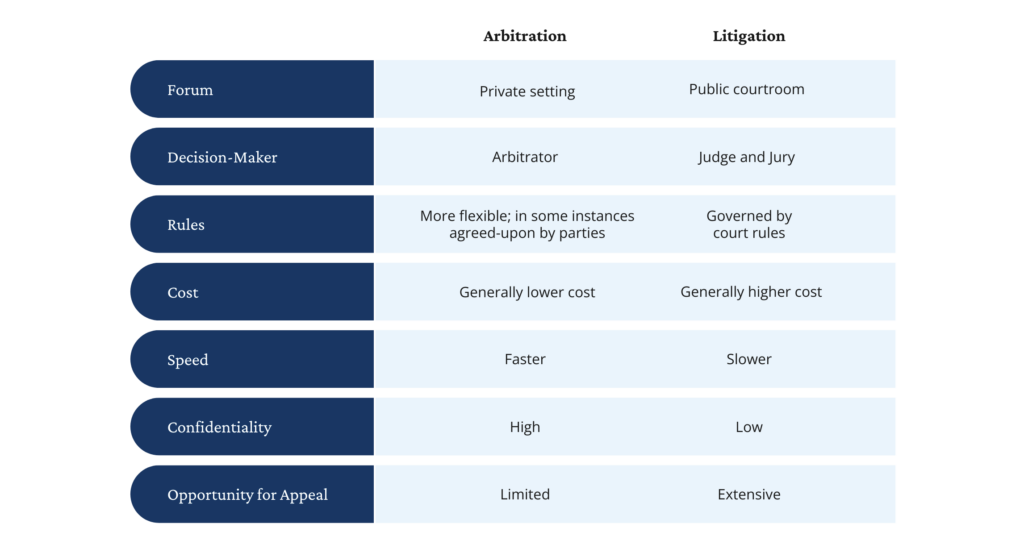Two businesses locked in a contract dispute over a high-stakes project.
A construction company and a developer clashing over delays and cost overruns.
An executive who believes they were fired without just cause, in violation of their employment agreement.
In each conflict, taking the case to court could mean years of litigation and mounting legal fees.
Now, imagine they opt for arbitration instead. Within a few months, they present their case to a neutral arbitrator who delivers a decision, keeping costs and public scrutiny to a minimum.
These scenarios illustrate the versatility and effectiveness of arbitration as an alternative to traditional courtroom litigation.
Whether it’s a commercial dispute or a sensitive family conflict, arbitration offers a pathway to resolution that is often faster, more cost-effective, and less adversarial than going to court.

What is Arbitration?
Arbitration is an Alternative Dispute Resolution (ADR) strategy in which parties agree to have their dispute resolved by a neutral third party, known as an arbitrator. The arbitrator hears arguments, reviews evidence, and makes a binding decision.
By agreeing to arbitration, the parties are waiving their right to a jury trial. Unless agreed otherwise, the decision is legally binding and cannot be appealed.
Why Arbitration?
Arbitration offers several advantages over traditional litigation, including its speed and cost-effectiveness. The American Arbitration Association reports that the average arbitration is resolved within 11.6 months, while U.S. District Court cases average 24.2 months just to get to trial.
Arbitration also offers a greater degree of confidentiality compared to public court proceedings. That can be particularly beneficial for businesses or individuals who wish to protect their reputation or sensitive information.
Key Benefits of Arbitration
- Cost-Effectiveness: Arbitration can often be significantly less expensive. The costs associated with court fees and legal representation are generally lower.
- Efficiency: Arbitration is typically faster than litigation, reducing the time and resources invested in resolving the dispute.
- Confidentiality: Arbitration offers a higher degree of confidentiality compared to public court proceedings.
- Flexibility: Arbitration provides greater flexibility in terms of scheduling, location, and procedures.
- Finality: Arbitration awards are generally final and binding, limiting the opportunities for further appeals.
Arbitration vs. Litigation
The chart below lays out the key differences between arbitration and litigation.

Note: Arbitration should not be confused with mediation. In arbitration, a neutral third party (the arbitrator) makes a binding decision. In mediation, a neutral third party (the mediator) facilitates communication between the parties to help them reach their own agreement.
The Process: How Does Arbitration Work?
Arbitration shares some similarities with court proceedings, as each side presents their case and supporting evidence.
Here’s how it works:
- Agreement to Arbitrate: The arbitration process begins when the parties involved in a dispute agree to submit their case to arbitration. This agreement can be part of a contract signed before a dispute arises or a separate agreement made after the conflict starts.
- Choosing an Arbitrator: Once the parties agree to arbitrate, they select an arbitrator or a panel of arbitrators.
- Pre-Arbitration Procedures: Before the arbitration hearing, the parties may engage in preliminary steps, such as exchanging relevant documents and evidence.
- Arbitration Hearing: During the hearing, each party presents their case. That includes presenting evidence, making arguments, and presenting witnesses. The arbitrator may ask questions to help clarify the issue.
- Deliberation and Decision: After the hearing, the arbitrator reviews the evidence and arguments presented. They then make a decision, known as an arbitration award. The decision is usually final and binding, meaning it can be enforced like a court judgment, with limited grounds for appeal.
Final Thoughts
The arbitration process is designed to be efficient and cost-effective, resolving disputes without the lengthy procedures and high costs associated with traditional litigation.
By offering a more streamlined approach, arbitration can save time, reduce expenses, and provide a fair resolution to conflicts.
If you are ready to resolve your business dispute, schedule a consultation now.
Frequently Asked Questions About Arbitration
Is an arbitration decision legally binding?
Yes, in most cases, an arbitration decision is legally binding. However, there are limited grounds for appeal, such as fraud or arbitrator misconduct.
Can I choose my own arbitrator?
Typically, yes. One of the advantages of arbitration is that parties often have a say in choosing their arbitrator. That can be done either by mutual agreement between the parties or through a selection process in which each side takes turns striking names from a list of potential arbitrators until one is chosen.
How long does the arbitration process usually take?
According to the American Arbitration Association, the average arbitration case is resolved within 11.6 months. However, the exact timeline can vary depending on the complexity of the case and the schedules of the parties involved.
